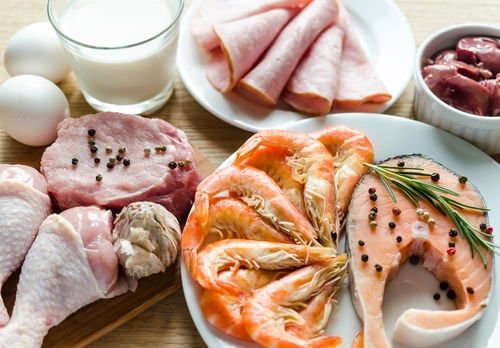Collagen-rich foods include beef, pork, chicken, fish, squid, shrimp, and oysters, as well as other animal products such as organ meats, gelatin, and calf's-foot jelly.
While collagen is not found in grains, seeds, fruits, leafy greens, or other vegetables, these food groups contain nutrients that are essential for collagen production in the body, including vitamin C, zinc, selenium, and silicon.
Talk to a registered dietitian about how to include collagen-rich foods as part of a healthy and well-balanced diet. Avoiding stress and getting a good night's sleep are also important for increasing collagen production in the body.

Main sources
Foods that are high in collagen include:
1. Beef
Beef is rich in collagen, which is mainly found in the cartilage, skin, and bones. The muscles also contain collagen, but in smaller amounts. Certain cuts of beef, such as brisket and chuck, contain more collagen than others.
2. Pork
Like beef, pork is also high in collagen, with amounts varying based on the part of the pig being consumed.
3. Chicken
The amount of collagen in chicken varies based on the age of the chicken, with older chickens containing higher amounts of collagen than younger chickens.
The highest quantities of collagen are found in the cartilage and the bones, with the neck and feet being especially high in collagen.
4. Bone broth
Bone broth is rich in collagen, which helps to maintain the firmness and elasticity of the skin, preventing fine lines, wrinkles, and sagging skin.
Bone broth may also be indicated as a complementary therapy in the treatment of osteoarthritis, helping to decrease inflammation and joint pain.
Also recommended: Bone Broth: 7 Health Benefits & How to Make It tuasaude.com/en/bone-broth-benefits5. Fish
Collagen is mainly found in the skin of freshwater and saltwater fish, but is also present in the bones and scales.
6. Gelatin
Gelatin contains large amounts of collagen, helping to firm sagging skin in addition to strengthening the bones and joints. It is produced by boiling the bones, cartilage, and skin of an animal.
7. Calf's-foot jelly
Calf's-foot jelly is made from bone marrow, a gelatinous component found inside the bones that is made up of collagen.
8. Organ meats
Organ meats, such as the heart or the intestines of an animal, also contain collagen and can be consumed in a variety of ways.
9. Shrimp
Shrimp also contains collagen, and can be a good option for those who do not eat read meat, pork, or chicken, for example.
10. Squid
Squid, like oysters and mussels, are a type of mollusk that is high in protein and also contains collagen.
11. Oysters and mussels
Collagen accounts for up to half of the proteins found in certain types of oysters and mussels, however the overall quantity is small.
12. Jellyfish
Some varieties of jellyfish are safe for human consumption and also contain collagen. While more commonly found in Asian cuisines, jellyfish is another option to add collagen to your diet.
Meal plan
The following meal plan is an example of how to incorporate more collagen-rich foods into your diet:
This meal plan is only one example that can be adjusted based on an individual's age and health status. It is recommended to consult a registered dietitian to develop a meal plan based on your specific nutritional needs.
Foods that help in the production of collagen
Foods that help in the production of collagen are:
- Foods high in vitamin C, such as pineapple, lemon, papaya, cashews, kiwi, tangerines, berries, watercress, broccoli, and tomato;
- Foods high in selenium, such as fish, black beans, sunflower seeds, brazil nuts, egg yolk, and liver;
- Foods high in zinc, such as beef, chicken, oysters, nuts, pumpkin seeds, and beef liver;
- Foods high in silicon, such as oats, watercress, brown rice, hazelnuts, and seaweed.
These nutrients are fundamental to collagen production and can help maximize the results of collagen treatments for health and beauty.
When to take collagen supplements
Collagen supplements may be recommended by a doctor or registered dietitian for the treatment of thinning hair, wrinkles and fine lines, osteoporosis, and osteoarthritis.
Collagen supplements are usually sold as hydrolyzed collagen in the form of capsules or a powder than can be diluted in water or lemon juice, for example.
Also recommended: Hydrolyzed Collagen: Uses, Health Benefits & How to Take tuasaude.com/en/hydrolized-collagen





























